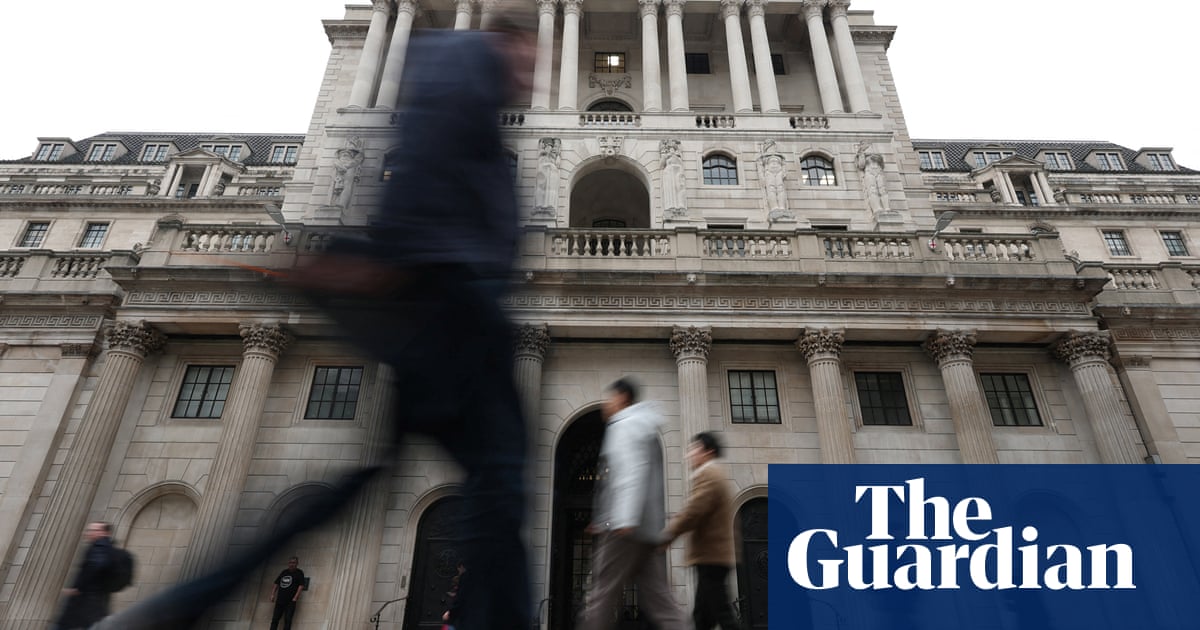Bank of England poised to cut interest rates amid UK economic gloom

Bank of England policymakers are poised to cut interest rates and downgrade forecasts for economic growth, underlining the risks facing Rachel Reeves’s budget plans.
With inflation continuing to decline, the nine-member monetary policy committee (MPC) is widely expected to cut rates by a quarter point to 4.5% – the lowest level since June 2023 – on Thursday.
The Bank will publish its quarterly assessment of the economic outlook alongside the decision, and economists expect it to cut its projection for GDP growth in 2025, from 1.5% down to about 1%.
James Smith, of analysts ING, said a weaker growth forecast from the Bank would, “shine a light on the Office for Budget Responsibility, the body that polices the government’s fiscal policy”.
The first iteration of the OBR’s updated growth forecast landed on Reeves’s desk in the Treasury earlier this week, and will determine whether she is on course to meet her self-imposed fiscal targets.
“At the time of the October budget, the OBR expected growth of 2% this year, which looked optimistic at the time and has only grown more so since,” Smith said.
If the OBR’s updated forecasts show the chancellor on course to bust her fiscal rules, she is expected to announce cuts to her budget spending plans when she addresses MPs on 26 March.
Her statement was originally intended to be a brief economic update; but with moves in government bond markets jeopardising the £9.9bn headroom the chancellor left herself to meet her rules, government sources have made clear that she could announce spending cuts.
Reeves told journalists in Davos earlier this month: “We’ve asked the independent Office of Budget Responsibility to do a forecast that will be published on 26 March and at that point, I’ll be setting out any changes that are necessary.”
The chief secretary to the Treasury, Darren Jones, has repeatedly said Reeves’s fiscal rules were “non-negotiable”.
However, in more upbeat news for Reeves, the 10-year yield on government bonds, known as gilts, sank to about 4.42% on Wednesday – the lowest level since 16 December – as markets readied for lower rates. Higher yields feed through into higher interest rates on the government’s debt pile.
Thursday’s reduction in borrowing costs is expected to be the first of several quarter-point rate cuts this year. Simon French, the chief economist at the investment bank Panmure Liberum, predicted as many as six reductions in 2025, but said the Bank would wait for political uncertainty to subside before switching to a faster pace of easing.
after newsletter promotion
“We don’t think the pivot to a faster pace of UK rate cuts from the Bank of England is imminent. That will have to wait until the late summer in our view,” he said.
The Bank has made clear it will be monitoring the impact of Reeves’s October budget, which some firms have predicted could push up prices because of higher employment costs passed on to the consumer.
The MPC has ratcheted up rates from a low of 0.1% in 2021, as the economy struggled to recover from the Covid pandemic, to a peak of 5% in summer 2023 as inflation surged.
With growth stalling in the second half of last year, the Treasury will be hoping that fresh rate cuts from the Bank help to generate a feelgood factor, by cutting the cost of business and home loans.
However, Simon Pittaway, senior economist at the Resolution Foundation thinktank, said: “I would be surprised if there is a big boost to confidence on the back of one quarter-point cut.”
Reeves used a speech in Oxfordshire last week to promise to back a third runway at Heathrow and sweep away obstacles to growth, including planning restrictions, but economists expect the benefits of these policies to be some years away.
Related
Why investing in women is a vital next step for…
Get Nadine White's Race Report newsletter for a fresh perspective on the week's newsGet our free newsletter from The Independent's Race CorrespondentGet our fre
Business secretary signals major shift on electric car policy to…
In a determined effort to retain Nissan’s manufacturing presence in Britain, Business Secretary Jonathan Reynolds has vowed to implement “substantial c
Joint Statement: Business Secretary and Fujitsu Services Ltd
Business and Trade Secretary Jonathan Reynolds today (Friday 7 March) met chiefs for Fujitsu in Tokyo to begin talks over the cost of redress for victims of th
UK foreign secretary backs multilateral defence funding for Europe
UK foreign secretary David Lammy has said that a new multilateral fund will be needed to secure Europe’s defence as he confirmed that Britain is “open to”













